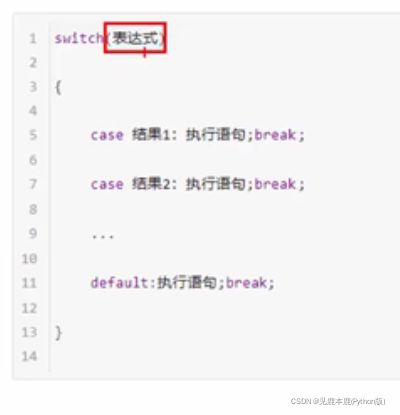4_C++_程序流程结构
1、三种程序结构
顺序结构
选择结构(分支)
循环结构
2、选择结构
单行格式:if ( 条件 ) { 条件执行语句 }
注意:if条件后面,语句块后面,不要加分号
多行格式:if ( 条件 ) { 条件执行语句 } else { 条件执行语句 }
跟C语言差不多
多条件语句:if ( 条件1 ) { 条件执行语句1 } else if ( 条件2 ) { 条件执行语句2 } …else { 条件执行语句n+1 }
条件结构的嵌套:在条件执行语句里面在放入if语句,作用是更加精准执行任务
#include 3、三目运算符
语法:表达式?表达式1:表达式2;
意义:表达式True,执行表达式1,否则执行表达式2
本质是运算符,结果还是变量,仍然可以赋值
(变量1 > 变量2 ?变量1:变量2)=变量值
意思是原本变量1和变量2比较,哪个大就选择哪个变量,再将这个变量以新的变量值赋值。
4、switch语句
也是条件结构的一种
只能是整型或者字符型判断
不能判断区间
可以将浮点区间编码成整型变量再执行任务
跟C语言也差不多
注意:一个case最后面一定要配套break;否则执行完这个case之后,编译器会继续执行下面的case,直到结束!

5、循环结构while
语法:while (循环条件) { 循环体 }
用于重复的语句,便于减少代码量
循环条件成立,执行循环体;不成立时跳出。
break; 断开循环体;
continue; 断开此次循环体,进入下一次循环。
6、案例1:猜数字游戏
系统随机生成1~100整数
用户不断输入整数
系统反馈“数值太大”/“数值太小”
直到用户输入正确了
#include 6、循环结构:do while语句
语法:do {代码块} while ( 循环条件 )
特点:先执行一次代码块在判断循环条件
7、案例2:寻找水仙花数
水仙花数是指一个三位数
它的百位、十位和个位的三次幂相加仍等于他自己。
#include 8、循环结构:for语句
语法:for( 起始表达式; 循环条件; 末尾循环体; ) { 代码块 }
中间的三个表达式,倘若在前面提到了,可以不写
9、案例三:敲桌子游戏
在0~100中,凡是出现数字7的,或者是7的倍数,均要“敲桌子”
#include 10、嵌套循环
也就是在循环体中再增加一次循环
外层执行一次,内层执行一周
#include 11、案例四:乘法口诀表
#include 输出的结果如下:
1*1=1
1*2=2 2*2=4
1*3=3 2*3=6 3*3=9
1*4=4 2*4=8 3*4=12 4*4=16
1*5=5 2*5=10 3*5=15 4*5=20 5*5=25
1*6=6 2*6=12 3*6=18 4*6=24 5*6=30 6*6=36
1*7=7 2*7=14 3*7=21 4*7=28 5*7=35 6*7=42 7*7=49
1*8=8 2*8=16 3*8=24 4*8=32 5*8=40 6*8=48 7*8=56 8*8=64
1*9=9 2*9=18 3*9=27 4*9=36 5*9=45 6*9=54 7*9=63 8*9=72 9*9=81
请按任意键继续. . .
12、break/continue/go_to语句归纳
break:在switch…case…是跳出本case;在循环语句内是跳出本循环语句块;在嵌套循环内表示跳出就近的循环语句块。
continue:跳过本次循环,执行新一次循环。
go_to:无条件跳转代码,频繁使用go_to容易造成程序崩溃。使用go_to语句时后面要增加标记,需要在后面补上对标记的定义。